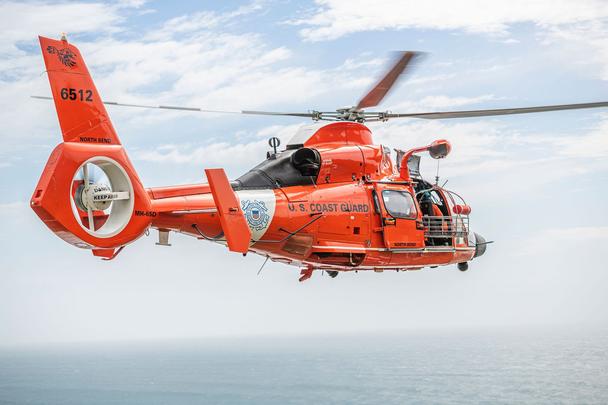Airbus and the U.S. Coast Guard - an iconic partnership of more than 40 years

Employees who were there can still describe in detail the palpable excitement in the air when Airbus, Aerospatiale at the time, won the U.S. Coast Guard contract for nearly 100 MH-65 Dauphin helicopters for short-range recovery missions in 1979. It was the beginning of a new era for the small North Texas aviation company. An era that continues today, and that is set to continue at least into 2040.
Providing more support and spare parts availability
Supporting any large fleet of this size is an undertaking, and it’s no surprise that supporting the nearly 100 MH-65 helicopters still flying today – the first of which was delivered in 1984 - presents no shortage of logistical and spare parts challenges. In order to help support the through-life objectives of the USCG, Airbus Helicopters, Inc. recently renewed its commitment to support their fleet through a 10-year sustaining contract, with the goal of improving spare parts availability and planning and providing increased Airbus support. The contract includes dedicated personnel, training, and technical publications.
Prolonging the fleet's service life
Airbus Helicopters has also been working with the Coast Guard to upgrade the Coast Guard’s existing fleet of MH-65s with a digital avionics suite, major structural modifications and new electrical wiring throughout the aircraft. These modifications will help prolong the aircraft’s service life beyond 2035.
“We are proud of our decades-long partnership with the Coast Guard and honored to support a team who flies 24/7, often in treacherous conditions, with the ultimate goal of saving lives and protecting our nation,” said Anthony Baker, vice president of Customer Support at Airbus Helicopters, Inc. “We know that the USCG relies on us to help ensure they can continue to successfully carry out such critical missions, and we are working diligently to help overcome some of the challenges we currently face with spare parts availability and to provide the right solution for a customer who has placed their trust in Airbus for more than four decades.”
"We are proud of our decades-long partnership with the Coast Guard and honored to support a team who flies 24/7, often in treacherous conditions, with the ultimate goal of saving lives and protecting our nation."
Wide-range of successful missions
Since its delivery in 1984, the fleet of 100 MH-65 helicopters has played a critical role for the Coast Guard, from performing lifesaving missions after Hurricane Katrina and other natural disasters to executing successful search and rescues at sea and high-altitude mountainous terrain. The Coast Guard has accumulated an impressive 1.7 million flight hours – and counting - on the fleet at end of June 2021.
With their trademark bright orange hue, the helicopters are also used for drug interdiction and aboard sea-going cutters. Materials have been replaced on the aircraft to enable it to fly in negative 40 degrees Celsius, as the Coast Guard executes frequent missions in Antarctica.
'Always ready' when needed
Because the MH-65 is no longer in production, Airbus Helicopters works closely with manufacturers to ensure that spare parts are available when they are needed.
“We are committed to doing everything we can to help maintain full operational availability of the USCG’s MH-65 fleet,” said Baker. “We are working closely with our suppliers to speed up deliveries. We remain in very close contact with the USCG as we continue to proudly support the live-saving missions they perform every day.”
A total of eight Airbus Helicopters personnel in the U.S. and France are dedicated to the new support contract, including two employees on-site at the Coast Guard’s facility in Elizabeth City, North Carolina.
Technical Publications and Training for technicians on both Maintenance Repair Operations and Blade Repair will be included in the comprehensive support contract.
“Supporting the Coast Guard is among our very top priorities at Airbus Helicopters,” Baker said. “They’ve committed to being ‘always ready’ to support those in need in sea or on land, and we’re putting in place the necessary steps so we can remain ready to support them when they need us.”